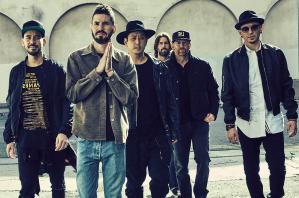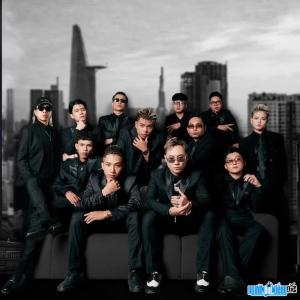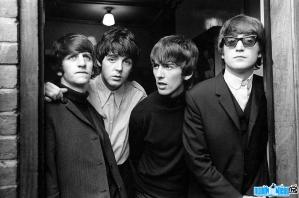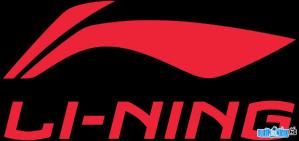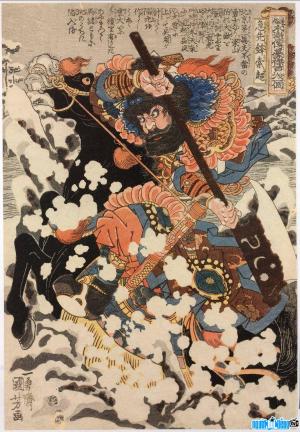Band Tfboys
Index of content:
Tfboys
Working place: Bac Kinh
Founding day: 6-8-2013 (13 years old)
Population of the world 2013: 7,095,217,980 (7/2013)
Global rank: #459
Facebook: weibo.com/tfwangjunkai?is_hot=1
Email: manager@tfent.cn
Phone number: updating
Who is Band Tfboys?
TFBOYS (Full name The Fighting Boys) is the youngest idol group in Chinese history, founded on August 6, 2013. TFBOYS was established by the Beijing Culture and Arts Company Fengjun Times through the selection of trainees from TF Family. TFBOYS is currently the top group in Cbiz, dubbed the "National Music Group" with a bright and positive image, a symbol of youth who constantly strives. On Weibo, TFBOYS has a strong fan base and only the group can compete with the popularity and popularity of the Korean group EXO.
Though operating time is short, but TFBOYS was named in many awards "Favorite Song", "Favorite Group" at prestigious awards ceremonies. Such as:
In 2014, TFBOYS released the song "Youth Training Manual" which became a big hit. The dance in the song went viral, and many stars followed suit. Following the success, TFBOYS released many songs such as: Faith in Chi Danh, Sung Ai, Young and all achieved remarkable success.
On December 29, 2015, TFBOYS released the 3rd mini album "Big Dreamer" with 6 songs.
In 2015, 2016 two members of the group Vuong Nguyen and Vuong Tuan Khai released a solo song. . By the end of 2016, Dich Duong Thien Ty also released a solo song and was equally successful as the other two members.
Member of TFBOYS:
TFBOYS (Full name The Fighting Boys) is the youngest idol group in Chinese history, founded on August 6, 2013. TFBOYS was established by the Beijing Culture and Arts Company Fengjun Times through the selection of trainees from TF Family. TFBOYS is currently the top group in Cbiz, dubbed the "National Music Group" with a bright and positive image, a symbol of youth who constantly strives. On Weibo, TFBOYS has a strong fan base and only the group can compete with the popularity and popularity of the Korean group EXO.
Though operating time is short, but TFBOYS was named in many awards "Favorite Song", "Favorite Group" at prestigious awards ceremonies. Such as:
- The "Dedication of the Year" Award in the 2014 Weibo Night
- The "King Weibo" Award in the 2016 Weibo Night
- Award "Active Energy Idol of the Year" at Weibo Night 2017
- Award "Best Group", "Favorite Group", "Top 10 Songs of the Year - Handbook" youth training" at ERC Chinese Top Ten Award 2015
- Award for "Best Group of the Year", "Potential New Group" at QQ Music Award 2015
- Award "Best Group of the Year", "Most Shared Song on QQ" at QQ Music Awards 2016.
In 2014, TFBOYS released the song "Youth Training Manual" which became a big hit. The dance in the song went viral, and many stars followed suit. Following the success, TFBOYS released many songs such as: Faith in Chi Danh, Sung Ai, Young and all achieved remarkable success.
On December 29, 2015, TFBOYS released the 3rd mini album "Big Dreamer" with 6 songs.
In 2015, 2016 two members of the group Vuong Nguyen and Vuong Tuan Khai released a solo song. . By the end of 2016, Dich Duong Thien Ty also released a solo song and was equally successful as the other two members.
Member of TFBOYS:
- Vuong Tuan Khai (born September 21, 1999) takes the position of captain, face of the group, vocalist, main rapper. Despite his young age, Vuong Tuan Khai once topped the top 10 Asian male gods. 2015 with Hollywood.
- Vuong Nguyen (born on November 8/ 2000) possesses a cute appearance and a cute and funny way of talking. Vuong Nguyen handles the high notes, his voice is appreciated. In some events, Vuong Nguyen can sing and play the piano at the same time. Having a talent for speaking, Vuong Nguyen takes on the role of MC in the group's show. Vuong Nguyen was also selected to participate in the blockbuster project "Tuoc Kiem".
- Translated Duong Thien Ty (born on 11/28/2000) into The member possesses many talents, especially the ability to dance, so he takes on the main dance role in the group. Translation Duong Thien Ty has a warm voice suitable for slow music.
Close relationship
Who is Girl friend/ wife/ darling members Band Tfboys?
Updating!
Updating!
How tall is Band Tfboys? What Tfboys's weight?
Height: updating
Weight: updating
Measurements: updating
Height: updating
Weight: updating
Measurements: updating
When was Band Tfboys born?
Tfboys Founding day 6-8-2013 (at the age of 13).
Where is Band Tfboys's birth place, what is Zodiac/Chinese Zodiac?
Tfboys was born in Bac Kinh, of China. Em, whose Zodiac is Leo, and who Chinese Zodiac is The Snake. Tfboys's global rank is 459 and whose rank is 4 in list of famous Band. Population of the world in 2013 is about 7,095,217,980 (7/2013) persons.
Tfboys Founding day 6-8-2013 (at the age of 13).
Where is Band Tfboys's birth place, what is Zodiac/Chinese Zodiac?
Tfboys was born in Bac Kinh, of China. Em, whose Zodiac is Leo, and who Chinese Zodiac is The Snake. Tfboys's global rank is 459 and whose rank is 4 in list of famous Band. Population of the world in 2013 is about 7,095,217,980 (7/2013) persons.
Celebrities born in:
/
/

TFBOYS is considered the national group in China.Three handsome members of the group TFBOYS

TFBOYS

a famous Chinese teen group.
#4
Top famous Band
#31
Top famous Zodiac of Leo
#38
Top famous Chinese Zodiac of The Snake
#8
Top celebrities born in 2013
#31
Top celebrities born in August
#12
Top celebrities born in 6th
#1
Born in Bac Kinh
Comment:
(Use English or Vietnamese)
Your name: Cotent:
Events in 2013 and 6-8
Events in the world in the birth year of Tfboys
- Jan. 1: France sends its military forces to Mali to fight against extreme Islamist militants. (Jan. 16): Islamist militants take about 40 foreign hostages at a remote BP site in Algeria. Many fear that the hostage situation is a result of the conflict in Mali.
- Jan. 22: Israeli prime minister Benjamin Netanyahu is elected to a third term.
- Jan. 25: Violent protests erupt throughout Egypt on the second anniversary of the revolution. Demonstrators focus their ire on the Muslim Brotherhood and the government of President Mohammed Morsi, frustrated that the country is on an ideologically conservative path and that Morsi has failed to bolster the economy or fulfill promises to introduce broader civil liberties and social justice. Dozens of people are killed in the violence. Morsi declares a state of emergency in three large cities: Suez, Ismailia, and Port Said.
- Feb. 11: Pope Benedict XVI announces his retirement, becoming the first pope to do so since 1415. He cites advancing age and a growing physical weakness as his reasons for retirement. He steps down on Feb. 28.
- Feb. 12: North Korea says it has detonated a third nuclear bomb. Earlier nuclear tests were conducted in 2006 and 2009.
- Feb. 14: South African runner Oscar Pistorius is arrested after police find his girlfriend, Reeva Steenkamp, dead from multiple gunshot wounds in his apartment. He is later charged with premeditated murder.
- March 5: Hugo Chavez, the president of Venezuela , dies of cancer at age 58. He had been in office for 14 years.
- March 8: In response to North Korea's nuclear test in February 2013, the UN Security Council unanimously passes another round of strict sanctions against North Korea. In a first, China is involved in drafting the sanctions. In response, North Korean president Kim Jong-un promises to launch "a pre-emptive nuclear strike" against the U.S. and South Korea and says he has voided the 1953 armistice that ended the war between North and South Korea.
- March 13: Cardinal Jorge Mario Bergoglio of Argentina is elected as the new pope, succeeding Benedict XVI. Bergoglio, 76, becomes the Catholic Church's 266th pontiff. He is the first pope from Latin America and the first Jesuit pope. He chooses the name Francis.
- March 14: Xi Jingping assumes the presidency of China. Of the 2,956 delegates, only one votes against Xi. He had earlier been named chairman of the Central Military Commission and general secretary of the Communist Party.
- April 1: Despite stiffer sanctions from the UN, North Korean president Kim Jong-un announces plans to expand his country's nuclear weapons and strengthen the economy. Kim prohibits South Korean workers from entering the Kaesong industrial park, which is run jointly by the two countries and is located in North Korea. Apr. 3: At a rare plenary meeting of the Central Committee, Kim says North Korea will continue to develop its nuclear weapons program despite sanctions and restart the mothballed nuclear facility in Yongbyon. Apr. 4: The U.S. announces it is deploying a missile defense system to Guam as a precautionary move.
- April 1: Despite stiffer sanctions from the UN, North Korean president Kim Jong-un announces plans to expand nuclear weapons and strengthen the economy in his country. Kim prohibits South Korean workers from entering the Kaesong industrial park, which is run jointly by the two countries and is located in North Korea. Apr. 3: At a rare plenary meeting of the Central Committee, Kim says North Korea will continue to develop its nuclear weapons program despite sanctions and restart the mothballed nuclear facility in Yongbyon. Apr. 4: The U.S. announces it is deploying a missile defense system to Guam as a precautionary move.
- April 13: Palestinian prime minister Salam Fayyad resigns amid infighting among the top echelon of the Palestinian Authority and popular discontent. Fayyad is credited with cracking down on corruption in the West Bank, improving infrastructure, and boosting the economy, which resulted in an increase in international aid.
- April 14: Nicolas Maduro wins the special presidential election in Venezuela the successor of Hugo Chavez. He takes office on April 19.
- April 18: Diplomats from both Britain and France report to the United Nations that there is credible information that the government in Syria has used chemical weapons recently in its civil war. According to both diplomats, the Syrian government has used chemical weapons multiple times since December 2012. Officials from Israel also say they have evidence that the Syrian government has used chemical weapons. President Obama has said that the use of chemical weapons by Syria's government could lead to a military response by the United States.
- April 24: A large building containing several factories in Bangladesh collapses, killing at least 900 people. Hundreds more are missing in the building's rubble. Known as Rana Plaza, the factories within the building make clothing for European and American retailers such as JC Penny, Cato Fashions, Benetton and others.
- May 31: In Istanbul, Turkey, a sit-in protesting government plans to raze Gezi Park in Taksim Square to build a shopping mall develops into enormous anti-government demonstrations after police begin spraying protesters with tear gas and water cannons. The demonstrations spread to dozens of cities throughout Turkey. June 13: Police storm the park, again spraying protesters with tear gas and water, and force protesters out of the area.
- June 4: A human rights team working for the United Nations reports that there are "reasonable grounds" to believe that government forces in Syria have used chemical weapons. French foreign minister Laurent Fabius reports that sarin, a nerve gas, has been used on multiple occasions.
- June 9: Edward Snowden, a former CIA employee, admitted that he was the source of leaks about the top-secret surveillance activities of the National Security Agency. June 21: The U.S. government filed espionage and theft charges against Snowden, who had earlier fled to Hong Kong. The government also requested that Hong Kong extradite Snowden. June 23: Fighting extradition, Snowden traveled from Hong Kong to Moscow.
- June 15: Hassan Rowhani, a moderate cleric and Iran's former negotiator on nuclear issues, wins Iran's presidential election, taking just under 51% of the vote.
- June 18: The Afghan National Security Force assumes complete responsibility for the security of the country, taking over the last areas under NATO control.
- June 26: Australian prime minister Julia Gillard resigns after being ousted as Labor Party leader in a party vote. Former Prime Minister Kevin Rudd replaces her as party leader and, the following day, replaces her as prime minister.
- June 30: On the first anniversary of President Mohammed Morsi's inauguration, as many as one million people take to the streets in planned demonstrations throughout Egypt and call for the president to step down. Their complaints against Morsi include the dismal state of the economy, Morsi's installation of members of the Muslim Brotherhood into many positions of power, as well as his failure to stem the sectarian divide between Sunnis, Shiites, and Christians, among other issues.
- July 4: The military deposes Egyptian president Mohammed Morsi and suspends the constitution, saying the move is an attempt at "national reconciliation" rather than a coup. Morsi, however, calls it a "complete military coup." He is taken into custody and several members of his inner circle are placed under house arrest. The move sparks massive protests in support of Morsi.
- July 22: Catherine, Duchess of Cambridge, gives birth to a baby boy. The baby is born at 4:24 p.m. and weighs 8 pounds 6 ounces. He is later named George Alexander Louis. He will also have the title His Royal Highness Prince George of Cambridge and is be third in line to the throne, following Prince Charles and Prince William.
- July 30: Israeli and Palestinian negotiators agree to begin new peace talks with the goal of reaching an agreement within nine months. The negotiations will be mediated by Martin Indyk, the U.S. State Department's new Mideast peace envoy.
- Aug. 1: Russia grants Edward Snowden, the American who leaked info about U.S. surveillance, asylum for one year. The temporary asylum allows him to leave the Moscow airport where he has been since June.
- Aug. 14: Police raid camps in Cairo, Egypt, where protesters have been demonstrating since the July ouster of President Mohammed Morsi. More than 500 people are killed, and the government declares a state of emergency. Mohamed ElBaradei resigns as vice president in protest of the military's action.
- Aug. 14: Israelis and Palestinians officially begin peace talks in Jerusalem. Expectations are low going into the talks, the third attempt to negotiate since 2000, and nearly five years since the last attempt. The talks begin just hours after Israel releases 26 Palestinian prisoners.
- Aug. 21: Opposition groups accuse the Syrian government of attacking rebel areas in Zamalka, Ein Terma, and Erbeen, suburbs east of Damascus, with chemical weapons. Gruesome, graphic images in the media show victims foaming at the mouth and twitching and lines of covered corpses. The opposition say as many as 1,000 people died in the attack. The government denies it used chemical weapons.
- Sep. 1: President Barack Obama announces that he will seek Congressional approval for military action against Syria in response to its alleged attack with chemical weapons on civilians. Sep. 4: The U.S. Senate Foreign Relations Committee votes, 10 to 7, to authorize military action in Syria. Sep. 15: A U.S.-led military attack is averted and diplomacy prevails when Russia and the U.S. reach an agreement that Syria must provide an inventory of its chemicals weapons and production facilities within a week and either turn over or destroy all of its chemical weapons by mid-2014. If the government fails to comply, then the UN Security Council will take up the issue.
- Sep. 16: The UN confirms in a report that the chemical agent sarin was used near Damascus on Aug. 21. "Chemical weapons have been used in the ongoing conflict between the parties in the Syrian Arab Republic, also against civilians, including children, on a relatively large scale," the report says. Sep. 26: The five permanent members of the Security Council agree on a resolution that requires Syria to hand over its stockpile of chemical weapons. If Syria fails to comply, then the Security Council will reconvene to determine repercussions, which could include military action or sanctions.
- Sep. 21: Shabab militants, based in Somalia, attack an upscale mall in Nairobi, Kenya, killing nearly 70 people and wounding about 175.
- Sep. 22: Chinese politician Bo Xilai is sentenced to life in prison. Eastern China's Jinan Intermediate People's Court finds him guilty of embezzlement, accepting bribes, and abuses of power, including a failed attempt to stifle the murder allegations against his wife.
- Oct. 5: U.S. commandos capture Nazih Abdul-Hamed al-Ruqai, a high-ranking al-Qaeda operative who is known as Abu Anas al-Libi, in Tripoli, Lebanon. He was indicted for helping plan the 1998 bombings of the U.S. Embassies in Kenya and Tanzania.
- Oct. 18: Saudi Arabia declines a non-permanent seat on the Security Council, a position it had been working toward for several years. The unprecedented move stuns both the UN and U.S. diplomats. "Allowing the ruling regime in Syria to kill and burn its people by the chemical weapons, while the world stands idly, without applying deterrent sanctions against the Damascus regime, is also irrefutable evidence and proof of the inability of the Security Council to carry out its duties and responsibilities," the Saudi ambassador to the UN says in a statement.
- Nov. 1: Hakimullah Mehsud, the leader of the Taliban in Pakistan, is killed in a CIA drone strike in Danday Darpa Khel, a militant stronghold in North Waziristan. It is an important victory over the Taliban for the U.S.
- Nov. 1: The trial of deposed Egyptian president Mohammed Morsi on charges of inciting the murder of protesters opens briefly in Cairo, but is adjourned until January 2014.
- Nov. 24: Iran reaches a six-month deal with the five permanent members of the UN Security Council and Germany to scale back its nuclear program. Iran agrees to halt production of uranium beyond 5 percent, which means it could only produce uranium for peaceful purposes; dilute or convert to oxide its stockpile of uranium enriched to 20 percent; not install new centrifuges; give UN inspectors daily access to enrichment facilities at Natanz and Fordo. In return, the crippling sanctions against Iran will be eased, pumping between $6 billion and $7 billion back into Iran's economy.
- Dec. 1: Hundreds of thousands of protesters in Kiev, Ukraine, demand that President Viktor Yanukovich resign. The protesters also call for the country to develop stronger ties to Europe and the West and move away from Russia. The protests started earlier after Yanukovich refused to sign political and free trade agreements with the European Union under pressure from Russia.
- Dec. 5: Nelson Mandela dies at age 95, after a lung infection and several months of ill health.
Founding day Tfboys (6-8) in history
- Day 6-8 year 1806: Emperor Francis II abdicated, marking the end of the Roman Empire.
- Day 6-8 year 1825: Bolivia declared its independence from Peru.
- Day 6-8 year 1926: Gertrude Ederle became the first U.S. woman to swim across the English Channel.
- Day 6-8 year 1945: The first atomic bomb used in warfare was dropped on Hiroshima, Japan.
- Day 6-8 year 1962: Jamaica gained its independence within the Britain Commonwealth.
- Day 6-8 year 1965: President Johnson signed the Voting Rights Act of 1965, which outlawed the poll taxes and literacy tests that had restricted black voter registration in the South.
- Day 6-8 year 1997: British prime minister Tony Blair and Sinn Fein president Gerry Adams meet—the first time in 76 years that a British leader and an IRA ally meet.
- Day 6-8 year 2003: Arnold Schwarzenegger announced his candidacy to replace Gray Davis as governor of California to Jay Leno on the Tonight Show.
- Day 6-8 year 2012: Curiosity, a SUV-size rover, successfully landed on Mars. The rover's research has been planned for the next two years, but since Curiosity's electricity is powered by plutonium, it could be operational and provide insight into Mars for decades to come
Other famous Band
Famous people born in Bac Kinh
Note about Band Tfboys
Tfboys infomation and profile updated by nguoinoitieng.tv.

